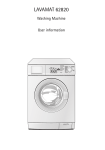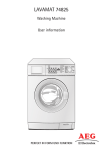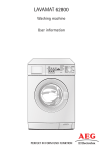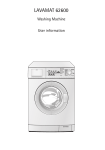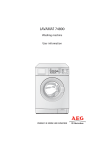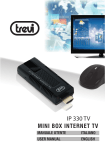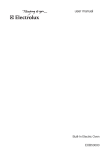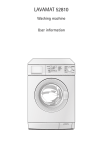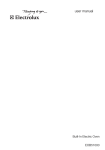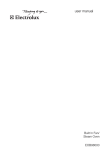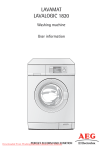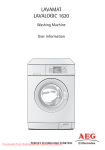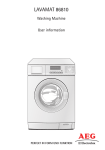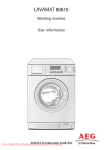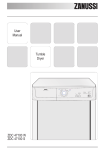Download Electrolux 62825 Washer User Manual
Transcript
LAVAMAT 62825 Washing Machine User information Dear Customer, Please read this user information carefully and keep it to refer to later. Please pass the user information on to any future owner of the appliance. 1 3 2 2 The following symbols are used in the text: Safety instructions Warning! Information that affects your personal safety. Important! Information that prevents damage to the appliance. Useful tips and hints Environmental information Contents Operating Instructions . . . . . . . . . . . . . . . . . . . . . . . . . . . . . . . . . . . . . 5 Safety . . . . . . . . . . . . . . . . . . . . . . . . . . . . . . . . . . . . . . . . . . . . . . . . . . . . . . . . . 5 Description of the appliance . . . . . . . . . . . . . . . . . . . . . . . . . . . . . . . . . . . . 7 Control panel . . . . . . . . . . . . . . . . . . . . . . . . . . . . . . . . . . . . . . . . . . . . . . . . . 7 Programme overview . . . . . . . . . . . . . . . . . . . . . . . . . . . . . . . . . . . . . . . . . . . . 8 Before the first wash. . . . . . . . . . . . . . . . . . . . . . . . . . . . . . . . . . . . . . . . . . . . 10 Preparing and sorting washing . . . . . . . . . . . . . . . . . . . . . . . . . . . . . . . . . . . 10 Running a wash cycle . . . . . . . . . . . . . . . . . . . . . . . . . . . . . . . . . . . . . . . . . . . Opening the door/loading washing . . . . . . . . . . . . . . . . . . . . . . . . . . . . . . . . . Adding detergent/conditioner . . . . . . . . . . . . . . . . . . . . . . . . . . . . . . . . . . . . . Switching on the appliance/selecting a programme . . . . . . . . . . . . . . . . . . . Changing the spin speed/selecting rinse hold . . . . . . . . . . . . . . . . . . . . . . . . Selecting additional programmes . . . . . . . . . . . . . . . . . . . . . . . . . . . . . . . . . . RINSE + . . . . . . . . . . . . . . . . . . . . . . . . . . . . . . . . . . . . . . . . . . . . . . . . . . . . . TIME SAVER. . . . . . . . . . . . . . . . . . . . . . . . . . . . . . . . . . . . . . . . . . . . . . . . . . PRE WASH . . . . . . . . . . . . . . . . . . . . . . . . . . . . . . . . . . . . . . . . . . . . . . . . . . . STAIN . . . . . . . . . . . . . . . . . . . . . . . . . . . . . . . . . . . . . . . . . . . . . . . . . . . . . . . Starting a programme . . . . . . . . . . . . . . . . . . . . . . . . . . . . . . . . . . . . . . . . . . . . Programme sequence . . . . . . . . . . . . . . . . . . . . . . . . . . . . . . . . . . . . . . . . . . . . Interrupting a programme/adding washing . . . . . . . . . . . . . . . . . . . . . . . . . . End of the wash cycle/removing the washing . . . . . . . . . . . . . . . . . . . . . . . . 11 11 11 12 13 13 13 13 14 14 14 14 15 15 Child safety device. . . . . . . . . . . . . . . . . . . . . . . . . . . . . . . . . . . . . . . . . . . . . . 16 Cleaning and maintenance . . . . . . . . . . . . . . . . . . . . . . . . . . . . . . . . . . . . . . 17 What to do if... . . . . . . . . . . . . . . . . . . . . . . . . . . . . . . . . . . . . . . . . . . . . . . . . . Remedying small faults yourself . . . . . . . . . . . . . . . . . . . . . . . . . . . . . . . . . . . If the wash result is not satisfactory . . . . . . . . . . . . . . . . . . . . . . . . . . . . . . . . Carrying out an emergency drain . . . . . . . . . . . . . . . . . . . . . . . . . . . . . . . . . . Drain pump. . . . . . . . . . . . . . . . . . . . . . . . . . . . . . . . . . . . . . . . . . . . . . . . . . . . . 18 18 20 21 22 Disposal . . . . . . . . . . . . . . . . . . . . . . . . . . . . . . . . . . . . . . . . . . . . . . . . . . . . . . . 23 Technical data. . . . . . . . . . . . . . . . . . . . . . . . . . . . . . . . . . . . . . . . . . . . . . . . . . 24 Consumption values. . . . . . . . . . . . . . . . . . . . . . . . . . . . . . . . . . . . . . . . . . . . . 24 3 Installation and connection instructions. . . . . . . . . . . . . . . . . 25 Safety information concerning installation . . . . . . . . . . . . . . . . . . . . . . . . 25 Installing the appliance . . . . . . . . . . . . . . . . . . . . . . . . . . . . . . . . . . . . . . . . . Transporting the appliance . . . . . . . . . . . . . . . . . . . . . . . . . . . . . . . . . . . . . . . . Unpacking. . . . . . . . . . . . . . . . . . . . . . . . . . . . . . . . . . . . . . . . . . . . . . . . . . . . . . Where to install . . . . . . . . . . . . . . . . . . . . . . . . . . . . . . . . . . . . . . . . . . . . . . . . . Making the appliance level. . . . . . . . . . . . . . . . . . . . . . . . . . . . . . . . . . . . . . . . 26 26 26 29 29 Electrical Connection . . . . . . . . . . . . . . . . . . . . . . . . . . . . . . . . . . . . . . . . . . . 30 Connecting to the water supply . . . . . . . . . . . . . . . . . . . . . . . . . . . . . . . . . . 31 Water inlet . . . . . . . . . . . . . . . . . . . . . . . . . . . . . . . . . . . . . . . . . . . . . . . . . . . . . 32 Water Drainage . . . . . . . . . . . . . . . . . . . . . . . . . . . . . . . . . . . . . . . . . . . . . . . . . 33 Guarantee/Customer Service . . . . . . . . . . . . . . . . . . . . . . . . . . . . . . Service and Spare Parts 4 35 . . . . . . . . . . . . . . . . . . . . . . . . . . . . . . . . . . . 39 Operating Instructions 1 Safety Prior to using the appliance for the first time • Follow the “Installation and connection instructions”. • If the appliance is delivered in the winter months when there are minus temperatures: store the washing machine at room temperature for 24 hours before using for the first time. Correct use • The washing machine is only designed for the washing of normal domestic laundry at home. • Additions or modifications to the washing machine are not permitted. • Only use detergents/conditioners that are suitable for use in domestic washing machines. • The washing must not contain any flammable solvent. The risk of explosion exists. • Do not use the washing machine for dry cleaning. • Dyes/colour removers may only be used in the washing machine, if the manufacturer of these products expressly permits this. We cannot accept liability for any damage arising. Child safety • Keep packaging away from children. There is a risk of suffocation. • Children often do not recognise the hazards associated with electrical appliances. Do not allow children to use the washing machine unsupervised. • Make sure that children and pets don’t climb into the drum of the washing machine. The risk of death exists. 5 General safety • Repairs to the washing machine may only be carried out by qualified/ authorised service engineers. • Never use the appliance when the electrical cable is damaged or the control panel, worktop or plinth area are damaged to such an extent that the inside of the appliance is openly accessible. • Switch off the washing machine prior to cleaning it and carrying out maintenance. In addition, remove the power plug from the power point or – if the appliance has been hard-wired – switch off the cutout in the fuse box or completely remove the fuse. • If operation is stopped, disconnect the appliance from the mains supply and turn off the tap. • Never remove the power plug from the power point by pulling on the cable. Always pull the plug. • Multiway-plugs, connectors and extension cables must not be used. Resulting overheating may constitute a fire hazard. • Never wash the washing machine down with a water jet. Danger of electric shock. • When using wash programmes with high temperatures the glass in the door will become hot. Do not touch it! • Before emergency emptying of the appliance, before cleaning the drain pump or opening the door in an emergency, let the water cool down. • Small animals can nibble on electrical cables and water hoses. This can constitute a risk of electrocution and water damage. Keep small animals away from the washing machine. 6 Description of the appliance Detergent dispenser drawer Control panel Rating plate (behind door) Plinth flap/ Drain pump Screw feet (height adjustable) Control panel Spin/RINSE HOLD button Multidisplay Programme progress display Additional programme DOOR indicator buttons START/PAUSE button Programme selector 7 Programme overview 6kg • EASY CARES 60, 50, 40, 30, 20 3kg DELICATES 40, 30 3kg WOOL/ H (Hand-washing) 40, 30, COLD RINSE • • • • • •3) • •4) • • • • • • •4) • • • • • • • 2kg • • 3kg • • TIME SAVER RINSE HOLD COTTONS/LINEN 95, 60, 50, 40, 30 700 • 1200 6kg STAIN RINSE + ENERGY SAVING2) Programme Spin speed PRE WASH max. load 1) (dry washing) Additional programmes DRAIN SPIN 6kg REFRESH 3kg • • • • 1) A 10 litre bucket contains approx. 2.5 kg dry washing (cotton) 2) Programme settings for tests in accordance with or in the style of EN 60 456 and IEC 60 456 are described in the chapter “Consumption values”. 3) Recommended load for short progammes is 3kg; full loading is possible however with somewhat reduced cleaning results. 4) STAIN can only be set from 40°C upwards, as stain removal agent only becomes effective at higher temperatures. 8 Application/Features Energy-saving programme which washes at 60 °C for lightly to normally soiled whites or colours made of cotton/linen. Care symbols1) MO Programme for normally to heavily soiled whites/colours made of cotton/linen. JMO Programme for easy-care mixed fibres and synthetics. IKN Gentle programme for delicate textiles such as bonded fibres, micro-fibres, synthetics, net curtains (load max. 20 to 25 m2 curtains). If used together with RINSE HOLD, also suitable for fabrics with climatic membranes, e.g. outdoor clothing. IK Specially gentle programme for machine and hand-washable wool/silk. QLH Separate gentle rinse (3 rinse cycles, liquid conditioner is washed in from the compartment &, gentle spin). IKN QLH Draining following a rinse hold. Draining and spinning, e.g. following a rinse hold, or separate spinning of handwashed cottons/linen. Special programme which washes at 30 °C, approx. 30 minutes, for brief washing of e.g. worn-once, lightly soiled sports clothing or new clothes. JMO JMO IKN 1) The figures in the care symbols indicate the maximum temperatures. 9 Before the first wash 1. Open the detergent drawer. 2. Pour approx. 2 litres of water through the detergent drawer into the washing machine. This closes the water container when the next programme is started and the economy valve can function properly 3. To remove any production-related residues from the drum and water tank, perform the first wash cycle without a load. Programme: COTTONS/LINEN 95, press the TIME SAVER button, add approx. 1/4 measuring cup of detergent. Preparing and sorting washing Preparing washing • Empty the pockets. Remove foreign bodies (e.g. coins, paper clips, nails, etc.). • Do up zips, button up covers to prevent damage to washing. • Remove the runners from net curtains or cover them with a net or a bag. • Wash delicate and small items in a net/pillowcase, e. g. net curtains, tights, small socks, handkerchiefs, bras. Important: Bras and other items containing wires should NOT be washed in this washing machine. Sorting washing • By colour: Wash white and coloured washing separately. Washing can run. • By temperature, type of washing and care symbol. Important: Do not wash fabrics with the G care symbol (= do not wash!) in the washing machine. 10 Running a wash cycle Opening the door/loading washing 1. Open the door: pull the handle on the door. When the appliance is switched on, the DOOR and START/PAUSE indicators show whether the door can be opened: DOOR indicator START/PAUSE indicator Can the door be opened? illuminated green flashing red or not illuminated yes illuminated green illuminated red yes, after pressing the START/PAUSE button illuminated red or not illuminated flashing red or illuminated red no, water level and/or temperature too high 2. Separate washing and load it loosely. Mix large and small items. Important: Do not get any washing caught between the door and the rubber seal. 3. Firmly push the door shut. Door catch must audibly click shut. Adding detergent/conditioner Important: Only use detergents/conditioners that are suitable for use in household washing machines. Add detergent/conditioner in accordance with the detergent/conditioner manufacturer’s instructions. Observe instructions on the packaging. The amount of detergent used depends on: – the degree of soiling, – the load size – the hardness of the tap water. • If the manufacturer does not make any recommendations with regard to small volumes of washing: For a half-load use a third less, and for a very small load use only the half the amount of detergent that is recommended for a full load. • Water softener should be used from water hardness range 2 (=medium). The amount of detergent used can then always be that as for 11 hardness range 1 (=soft). Your local water company will provide you with information about water hardness in your area. 1. Pull out the detergent drawer as far as it will go. 2. Add the detergent/conditioner. 3. Push the detergent drawer in fully. Washing powder/tablets for the main wash cycle Conditioner/Wash-care products to preserve the shape of garments/Starch Stain removal agent/ stain removal tablets Washing powder/tablets for the pre wash cycle or water softener Washing powder/tablets for the main wash cycle If you are using water softener and require the right compartment for detergent for the pre-wash cycle, add the water softener on top of the detergent for the main wash cycle in the left compartment. Softener, wash-care products to preserve the shape of garments, starch Fill the compartment to no more than the MAX indicator. Add water to thick liquid concentrates in accordance with the manufacturer’s instructions before using them. Dissolve powder starch. If you are using liquid detergent: Add liquid detergent using measuring containers provided by the detergent manufacturer and place on top of the washing drum. Switching on the appliance/selecting a programme 3 12 Set the programme and temperature using the programme selector. The appliance is switched on by selecting a programme. – The programme progress display shows the programme steps that the selected programme will carry out. – The estimated programme duration (in minutes) appears in the multi-display. Changing the spin speed/selecting rinse hold 3 The washing machine suggests the maximum permitted spin speed suitable for the selected programme. You can reduce this spin speed: To do this, press the Spin/RINSE HOLD button repeatedly until the required indicator is illuminated. The spin speed for the final spin can be changed even during the programme. To do this: 1. Press the START/PAUSE button. 2. Change the spin speed. 3. Press the START/PAUSE button again. RINSE HOLD With RINSE HOLD the washing is left to soak in the final rinse water. No final spin takes place, only the intermediate spin. The intermediate spin depends on the programme and cannot be changed. Selecting additional programmes 3 If required, press additional programme button(s). The corresponding indicator will illuminate. If “Err” flashes in the multi-display, the selected additional programme cannot be used together with the wash programme set. RINSE + Two additional rinse cycles are carried out for the programmes ENERGY SAVING, COTTONS/LINEN, EASY-CARES and DELICATES (for example in cases of over-sensitive skin). TIME SAVER Shortened wash programme for lightly soiled items. 13 PRE WASH Warm pre-wash before the main wash that follows automatically; with intermediate spin for COTTONS/LINEN and EASY-CARES, without intermediate spin for DELICATES. STAIN For heavily soiled or stained washing. Stain removal agent will be rinsed into the wash at the optimum point in the programme. Can only be set for wash temperatures of 40°C and upwards as stain removers only become effective at higher temperatures. Starting a programme 3 1. Check that the tap is turned on. 2. Press the START/PAUSE button. The programme is started. If after pressing the START/PAUSE button E40 flashes in the multi-display, the END indicator flashes 4 times and at the same time an acoustic signal sounds 4 times, the door has not been correctly shut. Push the door firmly closed and press the START/PAUSE button again. Programme sequence 3 14 • The programme progress display shows the programme step that is currently being carried out. • The multi-display shows the estimated time remaining (in minutes) until the end of the programme. The time remaining can increase or stay the same for a while during the course of the cycle as the programme adjusts itself to various conditions (e.g. type of washing and quantity, out of balance spin detection, special rinse cycle, etc.). Interrupting a programme/adding washing Interrupting a programme • A programme can at any time be interrupted by pressing the START/ PAUSE button and resumed by pressing START/PAUSE again. • To cancel a programme before it has ended, turn the programme selector to OFF. Important: Be careful of water in the appliance. Adding washing Washing can be added, as long as the DOOR indicator is illuminated green. 1. Press the START/PAUSE button. The door can be opened. 2. Close the door and press the START/PAUSE button again. The programme will continue. End of the wash cycle/removing the washing At the end of the programme, END lights up on the programme progress display. The door can be opened as soon as the DOOR indicator is lit green. 1. Open the loading door and remove the washing. 2. Turn the programme knob to OFF. 3. Close the water valve. 4. After washing, pull out the detergent drawer a little to enable it to dry out. Keep the loading door very slightly open so that the washing machine can air. If RINSE HOLD has been selected: After the rinse hold, END lights up on the programme progress display. The water must first be drained: – Either turn the programme knob to OFF, then to DRAIN and press the START/PAUSE button (the water is drained without spinning), – or turn the programme knob to OFF and then to SPIN. Change the spin speed if necessary and press the START/PAUSE button (the water is drained and the washing spun). 15 Child safety device If the child safety device has been activated, the door can no longer be shut. Activating the child safety device: Use a coin to turn the knob (on the inside of the door) in a clockwise direction as far as it will go. 1 Warning! The knob must not be depressed after being set, otherwise the child safety device is not activated. The knob must stand out as shown in the illustration. Deactivating the child safety device: Turn the knob in an anti-clockwise direction as far as it will go. 16 Cleaning and maintenance Important! Do not use furniture care products or aggressive cleaners to clean the appliance. Wipe control panel and body with a damp cloth. Cleaning procedure If you plan to wash mainly at low temperature, you should run a hot programme from time to time. This will reduce any deposits and clean the appliance from the inside. Detergent dispenser drawer The detergent dispenser drawer should be cleaned regularly. 1. Remove the detergent dispenser drawer by pulling it firmly. 2. Remove the conditioner insert from the middle compartment. 3. Clean all parts with water. 4. Put the conditioner insert in as far as it will go, so that it is firmly in place. 5. Clean all parts of the washing machine, especially the nozzles in the top of the washing-in chamber, with a brush. 6. Insert the detergent dispenser drawer in the guide rails and push it in. Washing drum Rust deposits in the drum may occur due to rusting foreign bodies in the washing or tap water containing iron. Important! Do not clean the drum with acidic descaling agents, scouring agents containing chlorine or iron or steel wool. 1. Remove any rust deposits on the drum with a cleaning agent for stainless steel. 2. Run a washing cycle without any washing to clean off any cleaning agent residues. Programme: COTTONS/LINEN 95, press the TIME SAVER button, add approx. 1/4 measuring cup of detergent. 17 Door and rubber collar Regularly check whether deposits or foreign bodies are present in the folds of the rubber collar or on the inside of the glass door. Clean the glass in the door and the rubber collar regularly. What to do if... Remedying small faults yourself If during use of the appliance one of the following error codes is shown in the multi-display: – E10 (Problems with the water inflow), – E20 (Problems with the water outflow), – E40 (door open), please consult the following table. After the error has been remedied, press the START/PAUSE button. In the event of other errors (E and a number or letter): Switch the appliance off and then on again. Set the programme again. Press the START/PAUSE button. If the error appears again, please contact your local Service Force Centre, stating the error code. Problem Possible cause Power plug not plugged in or problem with the fuse. Washing machine does not work. Remedy Connect the plug to a mains socket. Check the fuse. The door is not shut proper- Close the door until the lock ly. audibly clicks into place. The START/PAUSE button was not pressed for long enough. Press the START/PAUSE button for a longer period of time. The door cannot be closed. The child safety device is ac- Deactivate the child safety tivated. device: When you press a button Err appears in the multi-display. The selected function cannot be used together with the wash programme set. Select another function. E40 appears. The END indicator is flashing 4 times, and si- The door is not closed prop- Close the door properly. Restart the programme. multaneously an acous- erly. tic signal is sounding 4 times. 18 Problem E10 appears. The END indicator is flashing once, and simultaneously an acoustic signal is sounding once. (Problems with the water inflow.) Possible cause The tap is shut off. Remedy Turn on the tap. Turn off the tap. Unscrew the The filter in the inlet hose hose, remove the filter and screw connection is blocked. clean it. The tap is blocked by limes- Check the tap and have it recale or faulty. paired, if necessary. The transport lock has not been removed. Removing the transport lock. The washing machine vibrates when operating Adjust the feet as described The screw feet not correctly or is not stable. in the installation and conadjusted. nection instructions. Washing has not been spun. Only a few large items of washing in the drum. Always load the drum as full as possible. Mix large and small items. The inlet hose screw connection is leaking. Tighten the inlet hose. The outlet hose is leaking. Replace outlet hose. Water is running out The drain pump lid has not from under the washing been closed properly. machine. Washing was caught in the door. Close the cover properly. Load carefully next time you wash. The emergency drain hose is Screw on the emergency leaking. drain hose firmly. The wash water is foaming a lot. At the end of the wash cycle the spinning stops. Probably too much detergent has been used. Follow the manufacturer's instructions exactly when measuring out detergent. There is a kink in the outlet hose. Straighten the hose. E20 appears. The maximum pump height The END indicator is of 1m has been exceeded. flashing twice, and simultaneously an acoustic signal is sounding The drain pipe is blocked. twice. (Problems with the water outflow.) Please contact your local Service Force Centre Switch off the appliance. Disconnect the power plug. Clean the drain pump. Remove foreign bodies from the pump housing. For sink spigot connections: Clean the spigot. The spigot is blocked. 19 Problem Conditioner has not been rinsed in, compartment w for conditioner is filled with water. Possible cause Remedy The softener insert in the Clean the detergent drawer, compartment for conditioninsert the conditioner insert ers has not been correctly firmly. inserted or is blocked. The door is locked. Wait until the DOOR indicator is illuminated green. The programme will continue when the power cut has endThe door cannot be ed. There has been a power cut. opened when the washing machine is switched (All the indicators have gone To remove the washing: out.) on. If water can be seen in the The door remains locked for appliance, prior to opening approx. 4 to 10 minutes. the door first let the water out (see section “Carrying out an emergency drain”). The washing is badly creased. Perhaps too many items were loaded. Observe the maximum load volume. If the wash result is not satisfactory The washing is grey and there are limescale deposits in the drum • Too little detergent was used. • An incorrect detergent was used. • Individual stains were not pre-treated. • The programme or temperature was not set properly. There are grey stains on the washing • Items that were soiled with ointments, fats or oils were washed using too little detergent. • The wash temperature used was too low. • A common cause is that conditioner – in particular the type in concentrated form - has come in contact with the washing. Wash out such marks as soon as possible and exercise care when using the said conditioner. Foam can still be seen following the final rinse • Modern detergents can cause foam to be created even during the final rinse. In spite of this, the washing has been sufficiently rinsed. 20 There are white residues on the washing • What can be seen here are insoluble substances which modern detergents contain. They are not the result of insufficient rinsing. Shake or brush the washing. If possible turn the washing inside out before washing. Check your choice of detergent. Especially with dark colours it is advisable to use liquid detergents. Carrying out an emergency drain 1 Warning! Prior to carrying out an emergency drain, switch off the washing machine and remove the power plug from the power point. Warning! The water that comes out of the emergency drain hose may be hot. There is a risk of scalding. Let the water cool before performing an emergency drain! 1. Open the plinth flap and remove it. 2. Remove the emergency drain hose. 3. Place a shallow container underneath it. Then loosen the drain plug by turning it in an anti-clockwise direction and pull it out. 4. The water will run out. If it is necessary to empty the container more than once, seal up the emergency drain hose with the drain plug while you are doing so. When the water has all drained away: 5. Insert the plug firmly into the emergency drain hose and turn it in a clockwise direction until it is firmly in place. 6. Replace the emergency drain hose into the retainer. 7. Insert the plinth flap into place and close it. 21 Drain pump 1 The drain pump is maintenance-free. It is only necessary to open the pump cover if there is a malfunction and water is no longer being pumped out, e.g. if the pump wheel is blocked. Before loading the machine, please always ensure that there are no foreign bodies present in the pockets or in between the items to be washed. Paper clips, nails, etc. which may find their way into the washing machine along with the washing will remain in the drain pump housing (foreign body trap that protects the pump wheel). Warning! Before opening the cover of the drain pump, switch off the washing machine and remove the power plug from the power point. 1. First carry out an emergency drain. 2. Place a cloth on the floor in front of the cover of the drain pump. Residual water runs out. 3. Unscrew the pump cover in an anticlockwise direction and remove it. 4. Remove foreign bodies and fluff from the pump housing and from the pump wheel. 5. Check whether the pump wheel right at the back of the pump housing can turn. (If the wheel rotates with a jerky motion, this is normal.) If the pumping wheel cannot be turned, please contact your local Service Force Centre. 6. Insert the pump cover. Insert the guides at the sides of the cover into the guide slots and tighten the cover by turning in a clockwise direction. 7. Close off the emergency drain hose and place it in the retainer. 8. Close the plinth flap. 22 Disposal 2 2 Packaging material The packaging materials are environmentally friendly and can be recycled. The plastic components are identified by markings, e.g. >PE<, >PS<, etc. Please dispose of the packaging materials in the appropriate container at your local waste disposal facilities. Old appliance W 1 The symbol on the product or on its packaging indicates that this product may not be treated as household waste. Instead it shall be handed over to the applicable collection point for the recycling of electrical and electronic equipment. By ensuring this product is disposed of correctly, you will help prevent potential negative consequences for the environment and human health, which could otherwise be caused by inappropriate waste handling of this product. For more detailed information about recycling of this product, please contact your local city office, your household waste disposal service or the shop where you purchased the product. Warning: When your appliance has finished its working life, remove the plug from the mains socket. Cut off the cable and plug and dispose of them. Destroy the door lock. This prevents children from trapping themselves inside and endangering their lives. 23 Technical data 5 This appliance conforms with the following EU Directives: – 73/23/EEC dated 19.02.1973 Low Voltage Directive – 89/336/EEC dated 03.05.1989 EMC Directive inclusive of Amending Directive 92/31/EEC – 93/68/EEC dated 22.07.1993 CE Marking Directive Height x Width x Depth 850 x 598 x 603 mm Depth when door is open 980 mm Height adjustment approx. +10/-5mm Load (depending on programme) Max. 6kg Area of use Domestic Drum spin speed see Rating Plate Water pressure 1-10bar (=10–100N/cm2=0.1–1.0MPa) Consumption values The consumption values were obtained under standardised conditions. They can differ in household use. Programme selector (Temperature) Load size in kg1) Water in litres Energy in kWh ENERGY SAVING2) 6 49 1,02 COTTONS/LINEN 95 6 62 2,20 COTTONS/LINEN 40 6 58 0,70 EASY CARES 40 3 58 0,52 DELICATES 30 3 58 0,42 WOOL H (Hand-washing) 30 2 54 0,35 1) The load size is determined in accordance with the EN 60456 standard loads. 2) Note: Programme settings for tests in accordance with or in support of EN 60 456 and IEC 60 456. Consumption values will vary from those quoted depending on the pressure and hardness of the water and its initial temperature, the room temperature, type and quantity of washing, detergent used, fluctuations in mains voltage and options selected. 24 Installation and connection instructions 1 Safety information concerning installation • This washing machine cannot be built-in. • Before using for the first time, check the appliance for damage sustained while it was being transported. Do not under any circumstances connect an appliance that is damaged to the mains. In the event of damage to the appliance contact your supplier. • Be sure to remove all the components of the transport lock before using the appliance for the first time. Otherwise when spinning damage may be caused to the appliance or to neighbouring units or furniture. • Before using the appliance for the first time, splash protection must be completed. (See “Removing transit packaging”). • Always plug the mains plug into a correctly installed shockproof socket. • If hard-wired: hard-wiring to the mains may only be carried out by a qualified electrician. • Prior to using the appliance for the first time, ensure that the rated voltage and current on the rating plate match the mains voltage and current where the appliance is to be installed. The required fuse protection is also to be found on the rating plate. • If work on the plumbing is required for the proper connection of the washing machine to the water supply, this must be undertaken by a competent person. • If work on the electricity supply system is required for the proper connection of the washing machine to the electricity supply, this must be undertaken by a registered electrician. • The washing machine’s mains cable must only be replaced by a Service Force Engineer 25 Installing the appliance Transporting the appliance 1 Warning: The washing machine is very heavy. There is a risk of injury. Exercise care when lifting the appliance. • Do not lay the washing machine on its front nor on its right side (as seen from the front). Electrical components may get wet. • Never transport the appliance without using the transport lock. Only remove the transport lock when the appliance is in its place of installation. Transporting the appliance without the use of the transport lock can cause damage to the appliance. • Never lift the appliance by the door when it is open nor by the plinth. When using a sack trolley to transport the washing machine: • Only use the sack trolley on the side of the appliance. Unpacking 1 The transport safeguard must be removed before putting the appliance into operation. Important! You are advised to keep all the packaging for re-use in case the machine is to be transported again. 1. After removing all the packaging, with assistance carefully lay machine on it’s back to remove the polystyrene base from the bottom. 26 2. Remove the power supply cable and the draining hose from the hose holders on the rear of the appliance. 3. With a suitable spanner unscrew and remove the central rear bolt A. Slide out the relevant plastic spacer. 4. Unscrew and remove the two large rear bolts B and the six smaller bolts C. 27 5. Remove the bracket D. 6. Refit the six smaller bolts C. 7. Open the porthole and remove the polystyrene block fitted with the adhesive tape on the door seal. 8. Fill the smaller upper hole and the two large ones with the corresponding plastic plug caps supplied in the bag containing the instruction booklet. Important! All the different plug caps are supplied with the appliance in the plastic bag containing the instruction booklet. 28 Connect the water inlet hose as described under the paragraph “Water inlet”. Where to install Important! The washing machine must not be operated in a room where there is a danger of frost. There is a risk of frost damage or adverse effect on the perfomance of the machine. Frost damage is not covered under the warranty. • The surface on which the appliance is to be installed must be firm and level. Do not install the appliance on carpeted floors or soft floor coverings. • The surface on which the appliance is to be installed must be clean and dry and free from grease, so that the appliance does not slide. • If the location in which the appliance is to be installed is fitted with small-format tiles, put a rubber mat (available in the shops) under the appliance. Making the appliance level The four feet of the appliance are pre-adjusted. Large degrees of unevenness can be compensated for by individually adjusting the height adjustable screw feet. Use the special spanner supplied to do this. Important! Do not use pieces of wood, cardboard or such like to level out unevenness in the floor, but adjust the height adjustable screw feet instead. 29 Electrical Connection 1 1 30 Any electrical work required to install this appliance should be carried out by a qualified electrician or competent person. WARNING – THIS APPLIANCE MUST BE EARTHED. The manufacturer declines any liability should these safety measures not be observed. Before switching on, make sure the electricity supply voltage is the same as that indicated on the appliance rating plate. The appliance is supplied with a 13 amp plug fitted. In the event of having to change the fuse in the plug supplied, a 13 amp ASTA approved (BS 1362) fuse must be used. Should the plug need to be replaced for any reason, proceed as described below. The wires in the mains lead are coloured in accordance with the following code: Green and Yellow: Earth Blue: Neutral Brown: Live • The wire coloured green and yellow must be connected to the terminal marked with the letter “E“ or by the earth symbol E or coloured green and yellow. • The wire coloured blue must be connected to the terminal “N“ or coloured black. • The wire coloured brown must be connected to the terminal marked “L“ or coloured red. • Upon completion there must be no cut, or stray strands of wire present and the cord clamp must be secure over the outer sheath. WARNING! A cut off plug inserted into a 13 amp socket is a serious safety (shock) hazard. Ensure that the cut off plug is disposed of safely. Permanent Connection 1 In the case of a permanent connection it is necessary that you install a double pole switch between the appliance and the electricity supply (mains), with a minimum gap of 3mm between the switch contacts and of a type suitable for the required load in compliance with the current electrical regulations. The switch must not break the yellow and green earth cable at any point. This appliance complies with the requirements laid out in the EEC Directive 76/899. Voltage 240 V AC: Fuse rating 13amps See rating plate for further information. This appliance meets VDE requirements. Particular regulations of local electricity authorities must be observed. This appliance conforms to EEC Directive No. 82/499/EWG on radio interference. WARNING! Repairs to electrical appliances must only be carried out by trained personnel. Improper repairs may lead to serious risks for the user. Connecting to the water supply Permitted water pressure The water pressure must be at least 1 bar (=10N/cm2 =0.1MPa), and may be a maximum of 10bar (=100N/cm2 =1MPa). – If more than 10bar: Connect a pressure reduction valve. – If less than 1bar: Disconnect the appliance end of the inlet hose from the solenoid inlet valve and remove the flow meter. (In addition remove the filter using pointed pliers and take out the rubber gasket behind it.) Replace the filter. 31 Water inlet Attention! • An inlet hose is supplied and can be found inside the machine drum. • Do not use the hose from your previous machine to connect to the water supply. • This appliance must be connected to a cold water supply. 1. Open the porthole and extract the inlet hose. 2. Connect the hose with the angled connection to the machine. Important! Do not place the inlet hose downwards. Angle the hose to the left or right depending on the position of your water tap. 3. Set the hose correctly by loosening the ring nut. After positioning the inlet hose, be sure to tighten the ring nut again to prevent leaks. 4. Connect the hose to a tap with a 3/4” thread. Always use the hose supplied with the appliance. 32 Water Drainage The appliance drain hose should hook into a standpipe, the hook in the drain hose is formed using the plastic “U-Piece“ supplied. The standpipe should have an internal diameter of approximately 38 mm (see diagram) thus ensuring there is an air break between the drain hose and standpipe. Important! It is essential to lay the drainage hose without kinks. When discharging into a standpipe ensure that the top of the curve in the hose end is no more than 90 cm (35.4’’) and no less than 60 cm (23.6’’) above floor level. The upright standpipe should have a minimum, length of 30 cm (12’’) from the bottom of the elbow to the top of the pipe (see diagram). Make sure that it is designed in such a way that the end of the drain hose cannot be covered with water. Longer drain hoses are available in lengths of 2.7 and 4 metres from your Service Force Centre. For drainage into an outlet spigot: If the outlet spigot has not been used before, remove any blanking plug that may be in place. Push the drain hose onto the spigot and secure with a clip if required. Ensure the drain hose is looped upwards to prevent waste water from the sink entering the washing machine. Important! The end of the drainage hose must not be submerged in the pumped-out water. Otherwise, the water could be sucked back into the appliance. 33 Pumping heights of over 1 metre The washing machine’s drain pump is able to pump water to a height of 1metre, calculated from the surface on which the appliance is installed. Important! If pumping height is over 1 metre malfunctions and damage to the appliance may arise. For pumping heights over 1metre a conversion kit can be obtained. Please contact Service Force Centre. 34 Guarantee/Customer Service European Guarantee This appliance is guaranteed by Electrolux in each of the countries listed at the back of this user manual, for the period specified in the appliance guarantee or otherwise by law. If you move from one of these countries to another of the countries listed below the appliance guarantee will move with you subject to the following qualifications: • The appliance guarantee starts from the date you first purchased the appliance which will be evidenced by production of a valid purchase document issued by the seller of the appliance. • The appliance guarantee is for the same period and to the same extent for labour and parts as exists in your new country of residence for this particular model or range of appliances. • The appliance guarantee is personal to the original purchaser of the appliance and cannot be transferred to another user. • The appliance is installed and used in accordance with instructions issued by Electrolux and is only used within the home, i.e. is not used for commercial purposes. • The appliance is installed in accordance with all relevant regulations in force within your new country of residence. The provisions of this European Guarantee do not affect any of the rights granted to you by law. www.electrolux.com p t b Albania +35 5 4 261 450 Rr. Pjeter Bogdani Nr. 7 Tirane Belgique/België/ Belgien +32 2 363 04 44 Bergensesteenweg 719, 1502 Lembeek Èeská republika +420 2 61 12 61 12 Budìjovická 3, Praha 4, 140 21 Danmark +45 70 11 74 00 Sjællandsgade 2, 7000 Fredericia Deutschland +49 180 32 26 622 Muggenhofer Str. 135, 90429 Nürnberg Eesti +37 2 66 50 030 Mustamäe tee 24, 10621 Tallinn España +34 902 11 63 88 Carretera M-300, Km. 29,900 Alcalá de Henares Madrid France www.electrolux.fr Great Britain +44 8705 929 929 Addington Way, Luton, Bedfordshire LU4 9QQ Hellas +30 23 10 56 19 70 4 Limnou Str., 54627 Thessaloniki Hrvatska +385 1 63 23 338 Slavonska avenija 3, 10000 Zagreb Ireland +353 1 40 90 753 Long Mile Road Dublin 12 Italia +39 (0) 434 558500 C.so Lino Zanussi, 26 - 33080 Porcia (PN) Latvija +37 17 84 59 34 Kr. Barona iela 130/2, LV-1012, Riga 35 36 p t b Lietuva +370 5 2780609 Verkių 29, LT09108 Vilnius Luxembourg +35 2 42 43 13 01 Rue de Bitbourg, 7, L-1273 Hamm Magyarország +36 1 252 1773 H-1142 Budapest XIV, Erzsébet királyné útja 87 Nederland +31 17 24 68 300 Vennootsweg 1, 2404 CG Alphen aan den Rijn Norge +47 81 5 30 222 Risløkkvn. 2 , 0508 Oslo Österreich +43 18 66 400 Herziggasse 9, 1230 Wien Polska +48 22 43 47 300 ul. Kolejowa 5/7, Warsaw Portugal +35 12 14 40 39 39 Quinta da Fonte - Edificio Gonçalves Zarco Q 35 2774 - 518 Paço de Arcos Romania +40 21 451 20 30 Str. Garii Progresului 2, S4, 040671 RO Schweiz/Suisse/ Svizzera +41 62 88 99 111 Industriestrasse 10, CH-5506 Mägenwil Slovenija +38 61 24 25 731 Electrolux Ljubljana d.o.o. Gerbiceva 98, 1000 Ljubljana Slovensko +421 2 43 33 43 22 Electrolux Slovakia s.r.o., Electrolux Domáce spotrebièe SK, Seberíniho 1, 821 03 Bratislava Suomi www.electrolux.fi Sverige +46 (0)771 76 76 76 Electrolux Service, S:t Göransgatan 143, S-105 45 Stockholm Türkiye +90 21 22 93 10 25 Tarlabaþý caddesi no : 35 Taksim Istanbul Ðîññèÿ +7 095 937 7837 129090 Ìîñêâà, Îëèìïèéñêèé ïðîñïåêò, 16, ÁÖ „Îëèìïèê“ 37 38 Service and Spare Parts If the event of your appliance requiring service, or if you wish to purchase spare parts, please contact Service Force by telephoning: 0870 5 929 929 Your telephone call will be automatically routed to the Service Force Centre covering your post code area. For the address of your local Service Force Centre and further information about Service Force, please visit the website at www. serviceforce.co.uk Before calling out an engineer, please ensure you have read the details under the heading „What to do if...“ When you contact the Service Force Centre you will need to give the following details: 1. Your name, address and post code. 2. Your telephone number. 3. Clear and concise details of the fault. 4. The model and serial number of the appliance (found on the rating plate) 5. The purchase date. Please note that a valid purchase receipt or guarantee documentation is required for in-guarantee service calls. Customer Care For general enquiries concerning your AEG appliance, or for further information on AEG products please contact our Customer Care Department by letter or telephone at the address below or visit our website at www.aeg.co.uk. Customer Care Department For Customer Service in the Republic of Ireland please contact us at the adMajor Appliances dress below: AEG Domestic Appliances AEG/ Electrolux Group (Ire) Ltd Addington Way Long Mile Road/ Dublin 12 Luton Republic of Ireland Bedfordshire, LU4 9QQ Tel: 08705 350350 (*) Tel: +353 (0) 1 4090754 Email: [email protected] (*) Calls may be recorded for training purposes 39 www.electrolux.com www.aeg-electrolux.co.uk 132 977 220-00-260107-02 Subject to change without notice








































